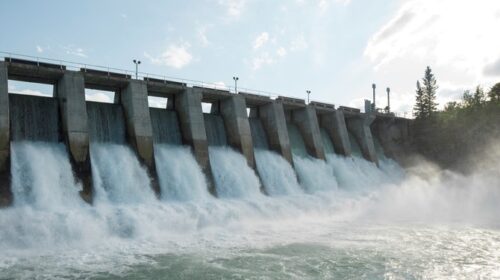Energy is crucial for socio-economic development, new dams and fully exploitation of renewable energy is the need of the hour to cope with ever increasing energy gap between supply and demand.
The consensus was reached at the end of round table conference on “Energy Needs of Pakistan” held here Thursday organised by a steel group of companies. Chairing the conference, Abdul Basit, former President Lahore Chamber of Commerce and Industry and convener Kala Bagh Dam committee, stressed the urgent need for full use of renewable energy resources and construction of new dams, including Kala Bagh Dam for storage of water for both irrigation and power purpose.
He said that hydropower was a major cheapest source of renewable energy in Pakistan with great potential and worth billions of rupees flood water can also be stored for multiple purposes. He said Pakistan had become world’s top 10 water-scarce nations. “Because of climate change and other developments, we suffer from floods during the summers and drought in the winter repeatedly. Trans-boundary water cooperation plays a crucial role in supporting wider regional integration, peace and sustainable development as well as tackling regional security challenges and in supporting climate change adaption”. He emphasised the need for trans-boundary cooperation that assumed even greater urgency with rising water scarcity.
The conference host Meher Kashif Younis, former senior Vice-President Lahore chamber said at present Pakistan meets its energy requirements of over 75 percent from domestic resources of which 50.4 percent by the indigenous gas, 28.4 percent by domestic and imported oil and 12.7 percent by hydro-electricity. About the renewable energy, he said Pakistan has four main renewable sources which included wind, solar, hydro and biomass. He said these resources had significant potentials providing solutions to long-lasting energy crisis grappling Pakistan. He said these resources if fully exploited in true spirit would help greatly improve to diverse energy supply market and decrease the depending on imported fuels and to do away with environment pollution.
Kashif said solar is believed to be one of the most endowed renewable energy resources which is equally reliable and capable of producing substantial amount of energy without posing adverse impact on the environment. He said geographical position and climate conditions in Pakistan is advantageous for the exploitation of solar energy.
Shahid Nazir, executive committee member Lahore chamber, underlined the need to combat with supply demand gap and a steady transformation was being observed throughout world from primary energy supplies based on conventional sources to renewable resources. Pakistan ought to continue to formulate efforts towards renewable energy endeavours. However, with the current gap between the demand and production of power in Pakistan, is alarming with a constant increase of 8–10 percent per annum, and the heavy dependence on limited fossil fuel resources, renewable alternatives which are able to commercially support conventional energy options must soon be in full-scale operation.
SAARC chamber founder Secretary General Rehmatullah Javed said policies for buying small scale renewable energy systems using a repayable loan scheme for public should be streamlined and made easy for encouraging the people. Security, law, and order situations in country must be addressed on priority to encourage local and foreign investments. The power demand of Pakistan is projected to increase up to 11,000 MW by the year 2030. Therefore, a more holistic approach by addressing all mentioned issues is important to fully utilise the renewable energy potential to achieve a sustainable energy future of the country. A determined political will is the key to energy independence, he concluded.






